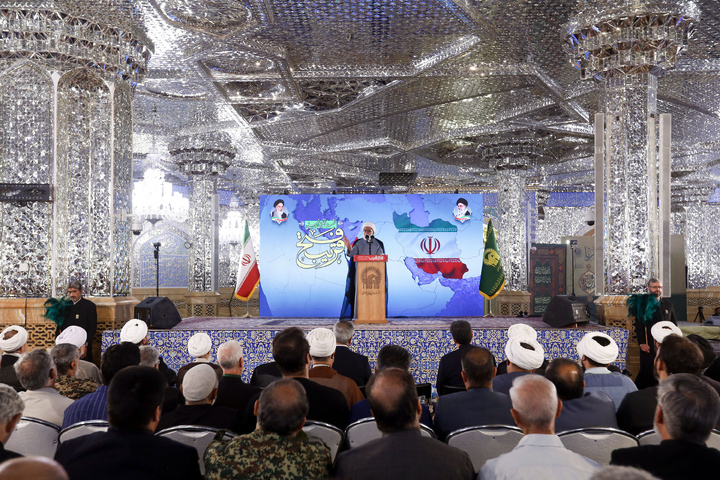Ayat. Ahmad Marvi described the most significant achievement of Iran’s resistance against the recent Israeli aggression as the emergence of rare national unity across all segments of society.
Speaking at the ‘Fat’h-e Qarib’ (literally meaning Imminent Victory) analytical session at Imam Reza Shrine, AQR’s Custodian emphasized: “In today’s world, beyond military strength, true victory belongs to those who can shape the narrative”.
He called on writers, speakers, and the public to actively engage in the battlefield of narratives to preserve and amplify this national achievement.
Ayat. Marvi began by honoring the memory of fallen top military commanders, air defense forces, and civilians killed in the Israeli strikes.
“Enemies are attempting to downplay Iran’s strategic gains and falsely portray Israel as victorious, despite its failure to achieve any of its objectives”, he warned.
He highlighted the exceptional unity shown by Iranians of diverse religious, cultural, and political backgrounds, noting: “Such cohesion had not been witnessed in the past 47 years. This solidarity was the most valuable outcome of the conflict”.
Ayat. Marvi stated: “The Islamic Republic was not the aggressor; rather, it was the enemy who launched the attack pursuing such goals as halting uranium enrichment, dismantling Iran’s nuclear program, seizing enriched uranium, triggering social collapse, and weakening Iran’s defense capabilities—all of which in vain though”.
He stressed that Iran’s nuclear knowledge is indigenous and cannot be destroyed with bombs. “Despite past assassinations of scientists, Iran’s scientific progress has continued without retreat”.
Head of AQR said the enemy misjudged the Iranian people’s resilience, expecting unrest and collapse. “Instead, the nation responded with unity, compassion, and patriotism”.
He recalled the 1967 Six-Day War, saying: “Israel and the U.S. hoped to replicate that scenario in Iran. However, Iran’s swift and organized response, including Operation “True Promise 3,” disrupted their calculations”.
He emphasized that the greatest gain was national unity, which shattered the enemy’s assumptions about Iran’s internal cohesion. “Even individuals with differing views stood together to defend the country”.
Ayat. Marvi added that the enemy believed Iran would take time to recover, but the Leader’s leadership quickly neutralized their plans.
“Iran’s deterrent power—rooted in science and faith—prevented a Gaza-like tragedy,” he explained, adding: “Without nuclear and missile capabilities, Iran would have been vulnerable”.
He criticized international organizations for failing to condemn the aggression and accused Western regimes of hypocrisy. “The war exposed the true nature of these institutions and regimes”.
The top official also rejected Israel’s claim of friendship with the Iranian people, pointing out that most victims were civilians in their homes.
He stressed the importance of diplomacy alongside military strength, noting: “regional countries’ positions toward Iran had shifted positively”.
Finally, AQR’s Custodian declared: “The real battle now lies in the realm of narratives. Every individual with a platform must convey the truth of this conflict, especially to the younger generation”.
He warned that indifference in this arena would hand victory to the enemy.
Marvi concluded by affirming that the enemy failed in all its malicious goals, and that the Iranian nation emerged victorious from this trial with unity, faith, and honor.


Your Comment